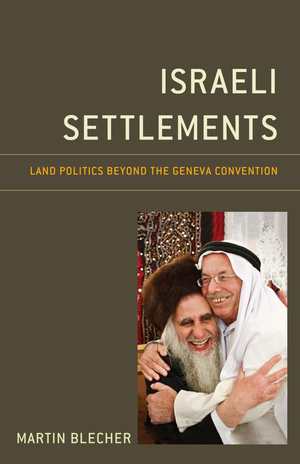In these times of intense attention focusing on the state of Israel from all portions of the political spectrum, a Swedish political scientist examines what seems to be the most contentious issue: the country’s settlements in Palestinian territory.
In Israeli Settlements: Land Politics Beyond the Geneva Convention, author Martin Blecher calls this issue “an infected question,” while taking on himself the challenge to examine it thoroughly. Most people, influenced by common sources, are convinced that the Palestinian settlements are illegal, but Blecher would rather refer to them as “imprudent,” beginning with the assertion that what are usually considered Palestinian lands were never in fact under Palestinian rule.
Citing the Hague Regulations of 1907 as one source of misconception, he states that Israel is one of the few countries actually in compliance with those regulations. Looking at Article 49 of the Geneva Convention IV, he demonstrates that Israel’s actions in Judea and Samaria (J&S) are not forbidden by that convention. It’s debatable that Israel is in fact an “occupying power” as defined in the convention, or that the West Bank can be designated as an “occupied territory.”
The history of Zionism is crucial to this understanding. For more than 2000 years the Jewish people longed for an agrarian, communally based homeland in a region characterized by colonization and conflict, and these aspirations were given extra ignition by the Holocaust. Blecher considers that any discussion of the Israeli settlements is “filled with dogmas and the lack of profound reasoning” and urges his readers to apply critical thinking and what he calls Exploratory Research to the matter.
Blecher sifts through legal precedents and historical minutiae as he explores his theme. He draws on such little known legal data as Ottoman and Turkish land law and notes that after the 1967 Six Day War the Israelis were not bound by any legal restriction in annexing “empty land.” The laws regarding Arab land ownership are murky at best, and Jews had a right of return to some Occupied Palestinian Territory. Though some will no doubt find these points controversial, the book overall is well-researched and well-reasoned.
Each chapter is copiously footnoted (in some cases with nearly as many pages of notes as pages in the chapter) indicating a depth of scholarly research that moves the book well outside the grasp of a casual reader, though such a reader could certainly benefit from an encapsulation of the facts presented. One item that will interest Blecher’s audience is a cataloging of the positions of American Presidents/administrations beginning with Lyndon Johnson, whose advisors insisted that nothing be done in the J&S region that might delay the Middle East peace process. The Reagan administration felt that Israel was being cast unfairly as a villain, highlighting Palestine’s repeated rejection of peace proposals, and the current administration would seem to support that view.
In taking on this difficult and debatable subject, Blecher amply demonstrates that he is a bold, largely impartial writer who, as objectively as possible, presents a wide range of relevant facts for others to consider. Through examining his erudite and well-organized case study, serious readers will be better educated and better able to reach their own conclusions.
Book Links
STAR RATING
Design
Content
Editing
Get an Editorial Review | Get Amazon Sales & Reviews | Get Edited | Get Beta Readers | Enter the SPR Book Awards | Other Marketing Services
























Leave A Comment